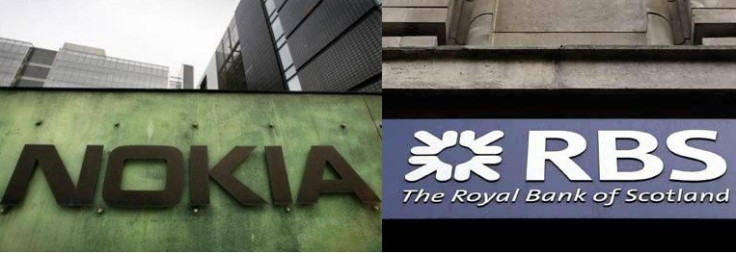Exclusive: RBS and Nokia Failed for Same Reasons

UK banking giant RBS and Finnish phonemaker Nokia may be classified as very different companies but according to experts, their downfall stems from similar problems.
Speaking exclusively to IBTimes UK, Simon Collinson, one of the authors of From Complexity to Simplicity, neither RBS nor Nokia was able to handle the growth and complexity of its businesses.
"The prime candidate as a problem bank is RBS with all the trials and tribulations it has experienced," says Collinson, who co-wrote the book with Melvin Jay.
"Even before RBS received government bailout cash we could see signs of over-complexity leading to major problems. RBS and Nokia are very similar in this case, as both overstretched resources by over-reaching into too many countries, launching too many products and business lines and were both subject to a number of mergers, which triggered bad business complexity that became unmanageable. We call these companies 'strugglers'."
In their book, the authors say that "bad complexity" occurs when a business effectively spirals out of management's control and becomes unmanageable in terms of size, infrastructure, product lines, geographical footholds and headcount. Eventually it delivers a negative net effect due to poor performance.
Having worked with major banks, insurance firms and other global giants across many sectors, Collinson said a number of companies have implemented a six-point framework in order to not suffer the fate of companies such as Nokia and RBS.
"We've mainly dealt with the giants in the corporate world, such as Bayer and Zurich Insurance, which are already big and multinational but they wanted to know why competitors that appear to be the same size were performing better and coping with complexity more," says Collinson.
"By being able to identify potentially harmful business practices and overly complex company frameworks, they were able to rectify this."
RBS the Struggler
RBS has become virtually nationalised, as the state now owns an 83 percent stake in it. The group has effectively de-globalised as it has downsized in terms of geographical presence, and pared down divisions and products.
Collinson and Jay have performed case studies on why RBS became the worst performer among the UK's banks and financial institutions. Both added that its highly complex structure and low performance led to an inevitable downfall.
"Since we wrote the first papers and the book, the UK has thankfully restructured a lot of the bank and sold off businesses that we would have advocated in the first place," says Collinson.
"What people have to understand, though, is what lies behind complexity. Just because an organisation is big in size and is spread across different regions, doesn't necessarily mean that this will lead to problems. It is how they manage it.
"For instance, HSBC is fairly global but it doesn't do as much business as some other investment banks in the US, and its simpler structure allows it to be better performing. It has a high level of geographical diversification and it appears it manages it better than most. Barclays also has substantially diversified geographical reach and it performs well because it has a narrower product range," he adds.
RBS has halved the size of its investment bank since the credit crisis and has pared back its geographical presence across the world. The CEO Stephen Hester has already announced that the bank would exit its cash equities, corporate broking, equity capital markets and mergers and acquisitions businesses globally.
The Fall of Nokia
Nokia is on the brink of collapse after the Finnish phonemaker failed to manage the business complexity it had created through a number of large-scale mergers and acquisitions (M&A) activity, says Collinson.
Since the 1980s, Nokia has been making mobile phones and by the turn of the century it had grown to become the most recognisable and biggest brand in the burgeoning mobile phone market.
While that success continued well into the middle of the next decade, the company is now in serious trouble and has laid off some 40,000 employees, sold off assets such as its luxury smartphone brand, its Qt software business and a raft of patents.
Ratings agencies Moody's, S&P and Fitch have identified the financial trouble Nokia is facing by all downgrading Nokia's credit rating to junk status and the company is set to have just €2.7bn in net cash by the end of 2012 - according to Morgan Stanley analyst Francois Meurnier.
Collinson says this mirrors the ailments of RBS which had branched off across too many different product lines and businesses and in which the companies could not control to a positive performing level.
"A high level of M&A [activity], one of the key complexity indicators in our research, tends to have a significant effect across all dimensions of organisational complexity," says Collinson and Jay. "When Nokia expanded into multimedia content and services, it engaged in a flurry of acquisitions that added new levels of diversity in terms of the geographic markets and range of businesses the firm was involved in.
"New divisions and layers of management, new IT structures and multiple processes and procedures were added, which required rationalisation and integration. Failure to cope effectively with these new sources of complexity left Nokia overwhelmed by costly complexity and was partly responsible for the firm's decline in fortunes," they add.
© Copyright IBTimes 2024. All rights reserved.






